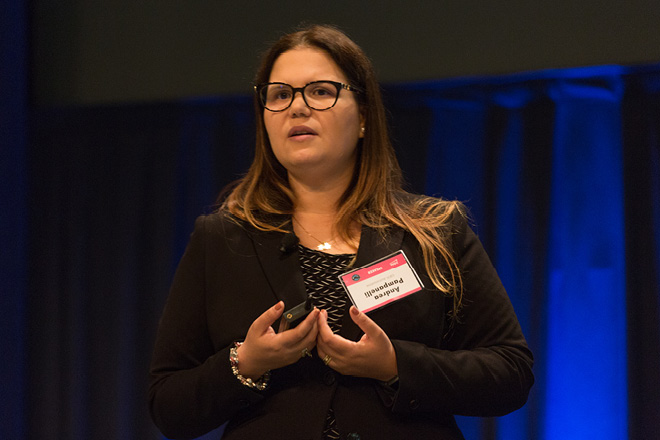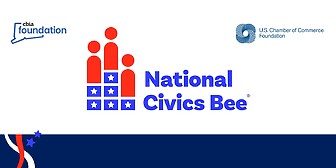Sustainability Is the Next Evolution in Capitalism’

David Reitz, CEO of Inventec Performance Chemicals USA, studied stockholder value and profits in college, but never thought about sustainability until a professor discussed the negative environmental impacts of some business practices.
“It made me wonder if I wanted to be part of something damaging the environment,” Reitz said Nov. 1 at the 2018 Connecticut Sustainability Conference sponsored by CBIA and Pratt & Whitney.

“Balance people, profits, and the planet.” GKN Automotive’s Andrea Pampanelli.
CONNSTEP president and CEO of Bonnie Del Conte moderated a panel discussion featuring Reitz, Bill Luchon, senior manufacturing engineer/environmental leader for Legrand, and John Strahley, managing director Ironwood Capital Connecticut.
The conference featured two panel discussions and two keynote speakers—Andrea Pampanelli, global environmental manager for GKN Automotive, and Anastasia O’Rourke, special consultant at Industrial Economics Inc.
Reitz said that what was merely a concept 25 years ago is now part of college curriculum—and should be part of every company’s business practices.
“Sustainability is the next evolution in capitalism,” he said. “It’s what’s going to pick winners and losers.”
‘Good for the Bottom Line’
Sustainability has always been good for the bottom line, the panelists said.
But customers now prefer companies that practice sustainability, employees want to work for sustainable companies, and it improves long-term productivity.
Businesses that have embraced sustainability for years, like Legrand, can still do more, Luchon said.

Sustainability incentives: CONNSTEP’s Bonnie Del Conte, Ironwood Capital’s John Strahley, Inventec’s David Reitz, and Legrand’s Bill Luchon.
“The cost was minimal and we’ve reduced energy consumption by 20% over the last 12 months,” Luchon said.
Strahley said investors prefer sustainable companies.
“Besides profitability, it helps with brand recognition, gives you a competitive advantage, and it meets regulatory requirements,” he said.
European Standards
Reitz said some products Inventec makes are subject to stricter standards in Europe than in the U.S. or China.
Nonetheless, Inventec applies the European standards to all its products worldwide, which paid dividends before Inventec ever advertised in the U.S., Reitz said.

“Implement solutions today.” Pratt & Whitney Canada’s Robert Cadieux.
“This was done with no marketing. It was my dream come true.”
Pampanelli, author of The Green Factory—Creating Lean and Sustainable Manufacturing, said companies must balance people, profits, and the planet.
Her book embraces a new concept she calls the Lean and Green Business Model.
It applies Lean thinking—improving processes by removing waste and increasing efficiency—to sustainability to create a new approach.
Lower Costs, Impact
Pampanelli depicted excess in production by following a ton of bauxite from Australia, across two oceans and 9,900 miles, on its path to becoming one-tenth of a ton of aluminum for use as soda cans in Britain. The cost was minimal and we've reduced energy consumption by 20% over the last 12 months.
The process involved one month of travel to Sweden or Norway, where it takes two-plus months to melt and produce aluminum bars, and more time to heat the bars to over 900 degrees to transform them into metal sheets.
The sheets are then further pressed into lighter sheets, then transported to Britain, where they are shaped into cans and filled with soda.
The soda is consumed in minutes, and the can discarded in less than one second.
In many ways, sustainability is about the future, said Robert Cadieux, director and fellow, environment and sustainable development at Pratt & Whitney Canada.
"It's implementing solutions today so we're not compromising future generations," Cadieux said.
"What we do has tangible effects on the planet that keeps us alive."
Trends and Opportunities
Eric Brown, vice president for manufacturing policy and outreach at CBIA, moderated a second panel focused on technology trends featuring S. Pamir Alpay, executive director of the Innovation Partnership Building at UConn Tech Park, and Ron Angelo, president and CEO of the Connecticut Center for Advanced Technology.

"Impact your suppliers." Industrial Economics special consultant Anastasia O'Rourke.
Alpay described the $170 million Tech Park as "the biggest investment UConn has ever made."
"It has some of the most advanced instruments available for advanced research," he said.
The park has 10 major industry partners that have committed $80 million in funding to advance research.
But, Alpay said, it will also provide small and mid-size companies access to technology they may otherwise not have via its Manufacturing Solutions Center.
Practical Applications
Angelo said CCAT, located in East Hartford near Pratt & Whitney, helps all manufacturers at no cost by identifying issues in manufacturing processes and finding solutions.
"We're here to move initiatives forward on advanced technology and applied technology specifically," Angelo said.
“We take an advanced material. How do we use it? How do we process it? What are the best machining methods?

Sustainability trends and opportunities: CCAT's Ron Angelo and the UConn Tech Park's Pamir Alpay.
O'Rourke has more than 16 years in sustainability experience and still finds her work interesting.
"You're always learning when you're in the sustainability field. That's what I like about it, because you go into different sectors and you learn about the technology and what's happening there," she said.
Every company should practice sustainability, she added.
"If your investors are asking you about these issues and your customers are as well, that's a good place to start," she said. "Analyze what they're asking."
O'Rourke said the most interesting work being done in sustainability today is in the supply chain.
"If you're in a position to work with your suppliers, that's where you'll have the biggest impact."
For more information, contact CBIA's Eric Brown (860.944.8792) | @CBIAericb
RELATED
EXPLORE BY CATEGORY
Stay Connected with CBIA News Digests
The latest news and information delivered directly to your inbox.



